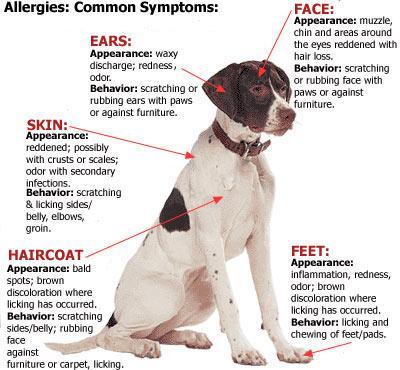Animals are as liable as people when it comes to catching allergies. Some people can get allergic throughout the year while some are lucky in this case and only catch allergies once in a year. These allergies aren’t only restricted to humans and your precious dog might also catch it. It is very important to use an allergy regimen that is highly effective in order to overcome this situation.
Antihistamines are considered to the most effective when it comes to treating allergies in dogs. And hence in this article, we’ve compiled all the info related to usage, dosage, and frequently asked questions which dog owners usually want answers to. Make sure that you practice the info rightly and your dog can easily be treated for allergies.
What is Allegra?
Allegra is a name given to an anti-allergic drug used for dogs called Fexofenadine HCl. This drug helps relieves almost every symptom of allergies that your dog might experience such as watery eyes, itching, redness of skin and irritation, rashes, runny nose, sneezing, skin hives formation etc.
You must not self-medicate your dog with an undefined dose of antihistamine. It is always advised to use the recommended and prescribed dose from your vet only. The dose works for all types of seasonal, atopic, or any other allergy.
While using Allegra, your dog can experience some mild side-effects which are temporary and go as soon as your dog has completed his Allegra course. However, these symptoms can aggravate if your dog is pregnant or breastfeeding to puppies. This can be harmful for the little ones too hence its contraindicated to use any antihistamine if your female dog is in any such condition.
What are the Symptoms of Dog Allergies?
Dogs can experience allergies in a number of different ways, but they are almost similar to what human’s experience. The allergies can showcase immediately after an exposure of allergens (substance or condition that can cause allergy) or a few days after the exposure.
Following are the symptoms which you can easily notice if your dog is suffering from an allergy:
- Sneezing
- Coughing
- Wheezing
- Watering of Eyes
- Redness of eyes
- Itchy eyes
- Itchy Skin
- Skin Hives
- Rashes
- Redness of skin
- Runny Nose
- Stuffy Nose
- Loss of appetite
- Lethargy
If you are noticing any of these symptoms in your dog, it is highly advised to take him to a veterinarian as soon as possible for starting an Allegra course immediately.
Can I Provide My Dog Allegra?
Allegra is considered a safe medication when it comes to being administered to the dogs. Some researchers even show that it requires quite a high dose of the medicine in order to become toxic.
The recommended dosage of Allegra for dogs is 2 mg per 1 kg. A regular antihistamine such as diphenhydramine (Benadryl) is only one mg per pound and is given after every eight hours.
According to this, if you have a dog weighing 80 pounds, he could safely have 80 mg of Allegra. This may sound like a much higher dose than what is given to a person, but antihistamines are not that effective in dogs as they are in humans that’s why the dogs require a higher dosage than humans.
Giving these heavy doses to your dog is completely safe but make sure that you are not altering the dose by yourself. You should always follow the directions of your veterinarian in this regard.
Also, avoid giving higher dose than the recommended one after every eight hours unless your vet had told you to do so. These cases are not observed frequently, they are quite rare, only if your dog has had quite a severe allergic reaction to something.
Things to Consider About Allegra for Dogs
Although once your vet recommends your dog to use Allegra, there is nothing more you should worry about. However, there are certain things which you must bring in your vet’s attention before he or she prescribes this to your dog. This information is usually asked by every vet but in case one forgets, it is your responsibility to make them take its notice.
Drug Composition
Most of the drug compositions are safe to use but based on different body chemistries, it is highly suggested that you note if the prescribed drug has anything which could be harmful for your dog. You must also notify the vet if your dog has previously used the drug that he is being prescribed this time and if it has caused any reaction or made any difference.
Good Brand
Never buy a cheaper brand of the same pharmaceutical drug just to save some bucks. Always buy the brand that your vet has recommended. Some cheaper brands do not have the standard compound of Allegra used in their medicine as they’ve labeled it. Sometimes the dosage might also not be accurate so just to be on the safe side, never switch the brand with something you don’t know about.
Pregnant Female Dogs
Make sure that you tell your vet if your dog is pregnant. Your vet will then prescribe a milder dose for treating allergies in pregnancy which are safe for your dog and its babies as well. Regular dosage can get transferred to the unborn puppies and can be harmful for them.
Breastfeeding Dogs
You also need to notify your vet if your dog has recently given birth and is feeding the puppies. Using high dose antihistamines in this duration can also transfer the drug to the dog’s milk which can then be transferred to its babies so its important to consider the fact of nursing little ones. In this case, your dog will be given a milder dose or such compounds which cannot be transferred to the babies.
Safety and Side Effects
Allegra is a medication that can be purchased directly, but not at any cost should it be administered without proper supervision and advice of your respective vet. It is highly recommended that a person should complete the prescribed dose rather than leaving it halfway through.
You can stop the medicine in between only if your vet advices you to do so. Most of the veterinarians formulate allergy treatment regimens that involve continuous administration of the medication even when the signs of allergy have stopped to appear, in order to prevent the relapse.
When being properly administered according to the directions of the veterinarian, Allegra, in fact has the least number of side effects. Some of the side effects that you may observe in your dog after the administration of Allegra are listed below:
- Nausea: After taking Allegra, your dog might develop a slight discomfort in the stomach and a sensation that he wants to vomit.
- Indigestion: Indigestion may also be referred as dyspepsia. It is a condition of an upset stomach. It generates discomfort in the area of upper abdomen. While suffering from indigestion your dog may have a lack of appetite, restlessness, drooling, excessive grass-eating, gagging, and burping, licking the lips, gurgling in the stomach etc.
- Dry mouth: The dry mouth of your dog can come from a number of different health conditions and environmental problems. Taking Allegra might also be one of them.
- Lethargy: Lethargy is an indication that there’s something that is troubling your dog. A dog suffering from lethargy would not be interested in playing games, talking a walk, or doing any other stuff that he usually enjoys doing.
- Vomiting: Vomiting is also a side effect observed in dogs while taking Allegra. Excessive And untreated vomiting may also lead to other health problems such as dehydration and loss of essential nutrients from the body of your dog.
- Diarrhea: Prolonged diarrhea may also lead to dehydration and weakness due to loss of vitamins and minerals from your dog’s body.
Conclusion
Antihistamines like Allegra might be safe for consumption by your dog, but this doesn’t mean that the additional excipients added to them are also safe for ingestion.
Make sure to read the label carefully every time you buy a medicine before giving it to your dog and not in any condition should you give a medication to your dog by yourself, always consult the respective veterinarian and follow his directions properly. Because after all you don’t want to cause any type of harm to your precious pup, and this is a very serious matter.
Frequently Asked Questions
Is Allegra suitable for my dog?
To find out if Allegra is suitable for your dog, visit your vet and follow his advice. In general, Allegra is suitable for almost all of the dog breeds and has no potential side effects or harmful consequences for any specific breed or age. Although if you have a female dog, you need to make sure that she is not pregnant or breastfeeding when you begin her course of Allegra.
Is Allegra safe for dogs?
As discussed above, Allegra is considered to be a safe antihistamine for dogs with any type of allergy. It helps get rid of the symptoms soon if given regularly as per the prescribed dose by your vet. Avoid altering, reducing, or increasing the dose on your own even if the symptoms fluctuate. Doing so can harm your dog. Otherwise, the medicine itself is not toxic even at high doses.


